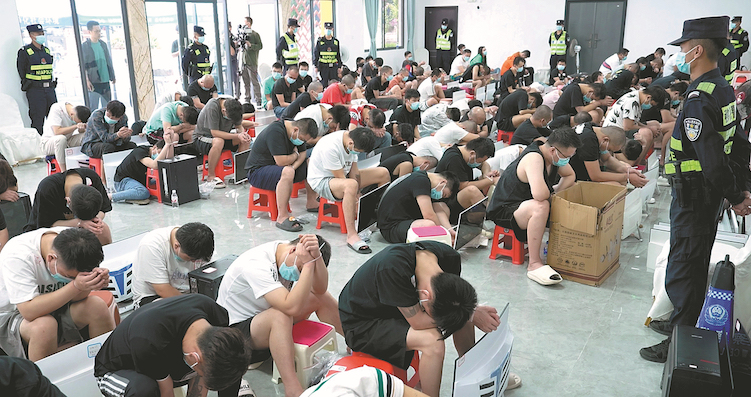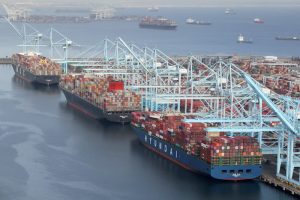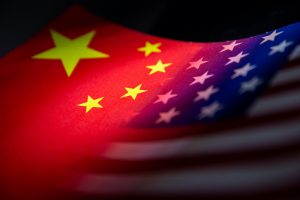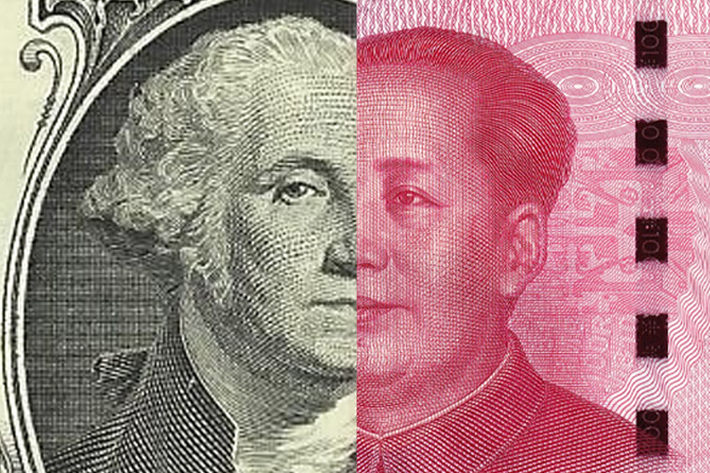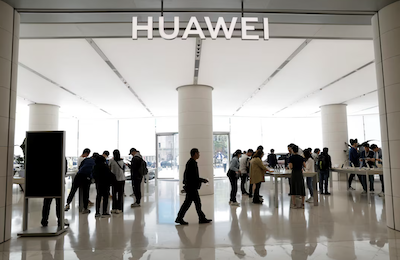China and Southeast Asia have seen an explosion in transnational organized crime that has been “super-charged” by illegal online casinos, underground banking systems, cryptocurrency and the civil war in Myanmar, according to the United Nations Office of Drugs and Crime.
An analysis published by the UNODC this week said over 340 licensed and unlicensed land-based casinos were operating in Southeast Asia as early as 2022, most of which have now shifted online, and utilize the vast underground banking and money laundering infrastructure in the ASEAN region and East Asia.
UNODC regional chief Jeremy Douglas, who spoke at a press conference in Bangkok on Wednesday night, said casinos in Southeast Asia were clustered in special economic zones (SEZs) along the China-Myanmar border, plus areas near the borders of Thailand, Laos and Cambodia.
Douglas said the Covid-19 crisis led to an dramatic expansion in online gambling and the technology used by online casinos had been adopted by criminal groups who set up cyber-scam operations in SEZs near the China-Myanmar border and other countries in the region in recent years.
ALSO SEE: Red Sea Shipping Disruption May Last ‘at Least a Few Months’
Chinese triads and criminal gangs were using infrastructure set up by online casinos as an underground banking system “and that infrastructure has super-charged the overall illicit economy of this region, including the drugs economy,” Douglas said.
“It’s effectively allowed for money movement in a much bigger and much more creative ways and more untraceable ways than in the past,” he said in a talk at the Foreign Correspondents Club in Bangkok (see video link).
“It’s incredibly difficult for governments to deal with this, as they have to deal with all the transactions and to understand that, because the innovation in that space is huge.”
An official from Thailand’s Anti-Money Laundering Office (AMLO) said problems had proliferated because drug tycoons were operating more freely in the Golden Triangle amid Myanmar’s civil war, and cyber crimes had grown to be the issue of most concern.
Transnational organized crime gangs were using cryptocurrencies and fast-evolving technologies which made it easier to set up bank accounts abroad to launder proceeds of crime, AMLO official Supranee Satitchaicharoen said, making cyber payments to banks or legitimate businesses to conceal their gains.
China hits back at ‘fraud epidemic’
China, which has been the focus of many cyber-scam groups and online casinos, has cracked down on online gambling plus fraud gangs both in and outside its borders, because of the huge scale of losses suffered by its citizens and the fact these criminal syndicates are usually operated by Chinese nationals.
The Ministry of Public Security said over 13 million citizens had sought help to stop them becoming victims of fraud, according to a recent report by the China Daily, which said authorities intercepted 2.75 billion fraudulent calls and 2.28 billion fraudulent messages.
The ministry had dealt with 8.36 million fraudulent Internet domain names, and intercepted 328.8 billion yuan ($46 billion) of funds related to fraud cases, it said.
“Task forces were dispatched to countries including Thailand, the Philippines, Cambodia, Laos, Vietnam and Indonesia for international law enforcement cooperation, resulting in the dismantling of numerous overseas fraud dens and the arrest of over 3,000 criminal suspects, creating a strong deterrent effect.”
A key focus were fraud groups operating in Kokang special region in Shan state in northern Myanmar, which were ousted by an alliance of three ethnic resistance groups who confronted the junta-backed militia protecting the criminal gangs last last year.
The UNODC’s Douglas said the cyber-scams “became an all-of-government issue in China .. as whole families had lost everything” to the scammers.
Boom in financial crime
Some senior financial officials in the US are also starting to warn that the scale of financial crime has risen dramatically.
Nasdaq researchers said more than $3 trillion in illicit funds flowed through the global financial system in 2023. That included $782.9 billion in drug trafficking activity, $346.7 billion in human trafficking, and $11.5 billion in terrorist financing, it said.
One year ago, a key target of Beijing was the Sun City group in Macau founded by casino operator Alvin Chau Cheok Wa, who was convicted in a high-profile crackdown on cross-border gambling.
The scale of money going through Chau’s casinos was far greater than his organisation admitted, with Douglas saying officials discovered over $100 billion went through Chau’s casinos over six to eight years.
“These were very big illicit money flows – it’s a political problem for this region and the world. The [Southeast Asian] region needs to respond to this at the highest political level. It’s not just a police issue.”
Chau, Sun City’s billionaire casino founder, ended up receiving an 18-year term, but regional police sources said he had been allowed to serve his sentence in Macau because he had “rolled over” and helped reveal details of his network on the mainland and other information on his computers.
While organized crime gangs holding thousands of people trafficked to work in cyber-scams centres had been forced out of cities such as Laukkai, Douglas said the UNODC and police within the region were watching to see if the organized crime gangs from Kokang shift to the notorious enclaves on the Thai-Myanmar border near the town of Myawaddy – or to other countries with weak governance in East Africa or elsewhere.
Meanwhile, there are now concerns that Thailand could be opening the door to a wave of organized crime if it gives a green light to casinos within the country.
A senior regional police source said the new Pheu Thai government had been warned to adopt strong security and anti-money laundering protocols, similar to those imposed in Singapore, to avoid the sort of problems likely to draw scrutiny from international watchdogs such as the Financial Action Task Force.
- Jim Pollard
ALSO SEE:
Big Tech ‘Doing Little’ to Counter Rampant Scams on Social Media
Macau Junket King Alvin Chau Gets 18 Years For Casino Crimes
Crime Gangs Control Some Myanmar, Laos Economic Zones: UN




